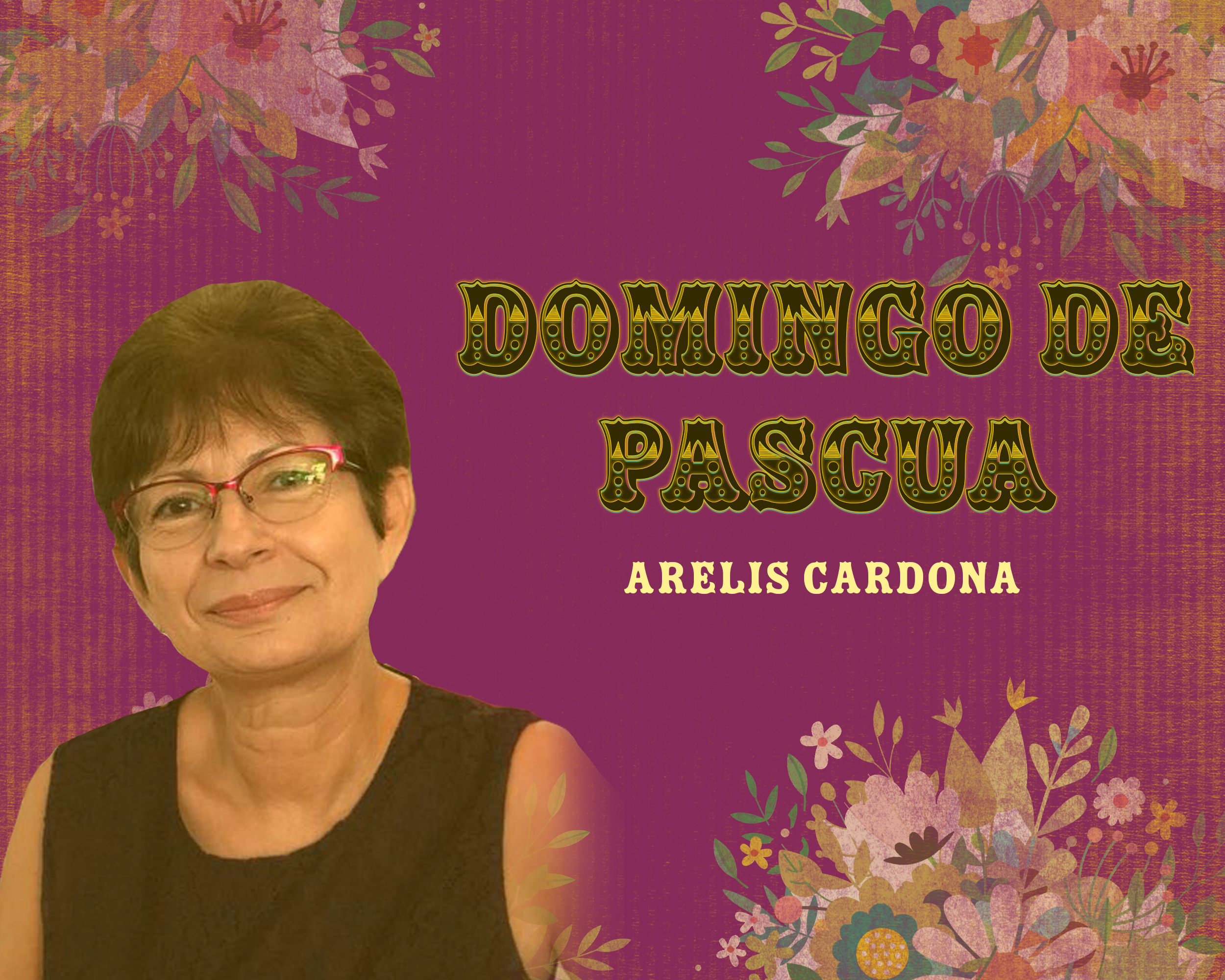Called by Name
Acts 10:34-43 NIV
John 20:1-18 NIV
What’s your name? You like your name? Do you know its meaning and the reason why it was selected for you?
In our Hispanic cultures, María is one of the most recognized and used names. That was the name of the mother of Jesus, who along with other Marys, was part of a group of women disciples, faithful followers of the Master who accompanied him, served and went up, along with him from Galilee to Jerusalem, on his last tour of the earth.
Mary Magdalene was one of them. Her name, her identity and value have gone down in history in the midst of an unfortunate diffusion of theories that are born from misinformation, prejudices and stereotypes that distract attention from what is truly valuable about her; her love, dedication and fidelity to the Lord.
Those women had accompanied, served, and used their resources to care for Jesus and his ministry, which included his disciples (Luke 8:1-3). During the events of the crucifixion and death of the Master they were facing the cross and when the body was taken to the tomb, from there they went out to prepare the aromatic spices and the perfumes with which they would anoint the body (Luke 23:55 and 56) . Therefore, Mary Magdalene knew very well where she was going early on Sunday morning. Her determination to be close to the Lord and carry out the rite of anointing was, as Isabel Gómez-Acebo says, to try with her affection and her callused hands of a working woman, to compensate for the suffering and anguish that the body of Jesus had suffered. So that he would be surrounded by something better than a simple sheet.
The name Maria, with different meanings depending on the root that is translated, means: the one who loves or is loved by Yahweh (the Lord). In the Hebrew tradition the name is closely linked with existence. Her middle name, which is usually associated with where she came from, Magdala, is also translated as tower, from a derivative of the Hebrew name. Mary Magdalene, who comes from a town called Torre, or Mary Magdalene, a nickname that Jesus could have given her (just as he did with Peter) meaning that she was a tower of strength and support among the disciples, suggests Mary Mowczko . Names that relate love and service, also identifying her as a faithful disciple.
In all the gospels she is mentioned by her full name in relation to the crucifixion, burial and resurrection. In the first part of the Johannine text (1-10), she walks alone towards the tomb at dawn on the third day and, finding it uncovered, goes to the disciples and tells them about what has happened. She returns there, where she is left alone again when the two disciples come out of the tomb, which she had not yet entered.
In the second part of the text (11-18) we find Mary drowning in tears and overwhelmed by the confusion of everything that happened. From the garden, for the first time she looks into the tomb to find two angels and another, outside, whom she thought was the gardener. Although they exchanged a few words, it is not until Jesus calls her by name that she recognizes him.
How important are our names! When the Lord calls us through them, we recognize his voice ( John 10:3 and 4). When Mary recognized that of Jesus her tears ceased. Lynn Japinga says that this moved her from devastating loss and hopelessness to almost unbearable joy. In the midst of the joy of mutual recognition, Mary refers to Jesus by one of his names. She says to him: Rabuni! My Master, affirming in this way the very special relationship that existed between the two.
How would you describe the relationship between Jesus and yourself? How do you call the Lord? He likes to call you by your name, to pronounce it with sweetness and determination.
In some biblical narratives, God changes people’s names. The name was also an expression of personality, so replacing it implied a change of character. He changed names of Abram, Sarai, and Saul. Interestingly, it was only Saul of Tarsus (Acts 22:6-9) and Mary Magdalene who experienced a personal encounter with the Risen Christ, whom he called by name and sent with a message. Saul became Paul. Maria didn’t change her name, she changed her life. Freed from everything that oppressed her (Mark 16:9), she became a faithful follower, capable of fulfilling the assignments received to sustain that friendship beyond the physical and temporal death of Jesus and even beyond the efforts to suppress it. She was the first to see the risen Christ, the first to tell others what she had seen, the first disciple of the Risen One. Her announcement of the presence of the Risen Christ is the central message of Easter, states Women’s Bible Commentary.
The story of Jesus did not end with his death, resurrection and ascent to heaven, a theme that the book of Acts tries to communicate. Although sadly the female disciples of Jesus are not, at this time, the bearers of the message, in chapter 10, it is Peter, at the beginning of the missionary action of the early church, who addresses the Gentiles. Having had an impressive vision (Acts 10:9-15) he is now able to understand that the Lord makes no difference between one person and another.
Heska, Peggy, Sofía, Mi Hee, common names in other cultures, are as beautiful as Carmen, Lupita, Rosa or Dolores. Our names also represent our ethnicities. When we understand, like Peter, that the Lord is a God of welcome, healing, and new beginnings, then every name is beautiful, valuable, an expression of who we are. Human beings in the form of women, who also testify, as the first female disciples did, about the life, ministry, death and resurrection of Jesus for salvation, for new life.
Mary Magdalene, called by her name, is the echo of the call of life in Christ Jesus. From the garden of our circumstances as Hispanic and Latina women, she calls us by name. When we welcome and celebrate ourselves represented in the names we bear, Life appears to us where we least expect. It calls us to exchange sadness and confusion for surprise, joy and security. He calls us to proclaim, with our actions and testimony, that others can feel valued and resurrected. Do you recognize his voice? Call us!
Let’s pray:
Rabouni!
I recognize your voice!
May mine, added to yours, call others by their names
to comfort, affirm and proclaim.
Resurrected Christ,
In your name we ask it.
Amen.
References
Study Bible God Speaks Today (DHH). 2000. United Bible Societies.
Isabel Gómez-Acebo, et al. 1997. Five Women Pray with the Senses . Spain. Desclee de Brouwer
ISHA, The Woman according to the Bible . 2008. United Bible Societies.
Japinga, Lynn. From Daughters to Disciples. Women’s Stories from the New Testament. 2021. Westminster John Knox Press.
Mowczko, Mary. Who was Mary Magdalene? May 26, 2014. Margmowczko.com
Newsom, Carol, et al. Women’s Bible Commentary , Revised and Updated. 2012. Westminster John Knox Press.
Wilton, Nelson. 1985. Illustrated Dictionary of the Bible . Caribbean Publisher.

The Rev. Arelis Cardona is an Ordained Minister of the Presbyterian Church in the United States of America and pastors the Rvdo. Ramón Olivo Robles in Monteflores in Santurce since 2003. She has Bachelor’s degrees in Social Sciences from the University of Puerto Rico at Mayagüez, Masters in Guidance and Counseling and in Divinity from the Inter-American University of Puerto Rico and the Evangelical Seminary of Puerto Rico, respectively.
She has served as Chaplain, Curriculum Writer for the Presbyterian and Methodist Church. She has actively participated in the government of the church at all levels of representation, being the first female minister to moderate the Boriquén Presbyterian Synod in Puerto Rico. She is a mother, grandmother and wife.



Unbound Social